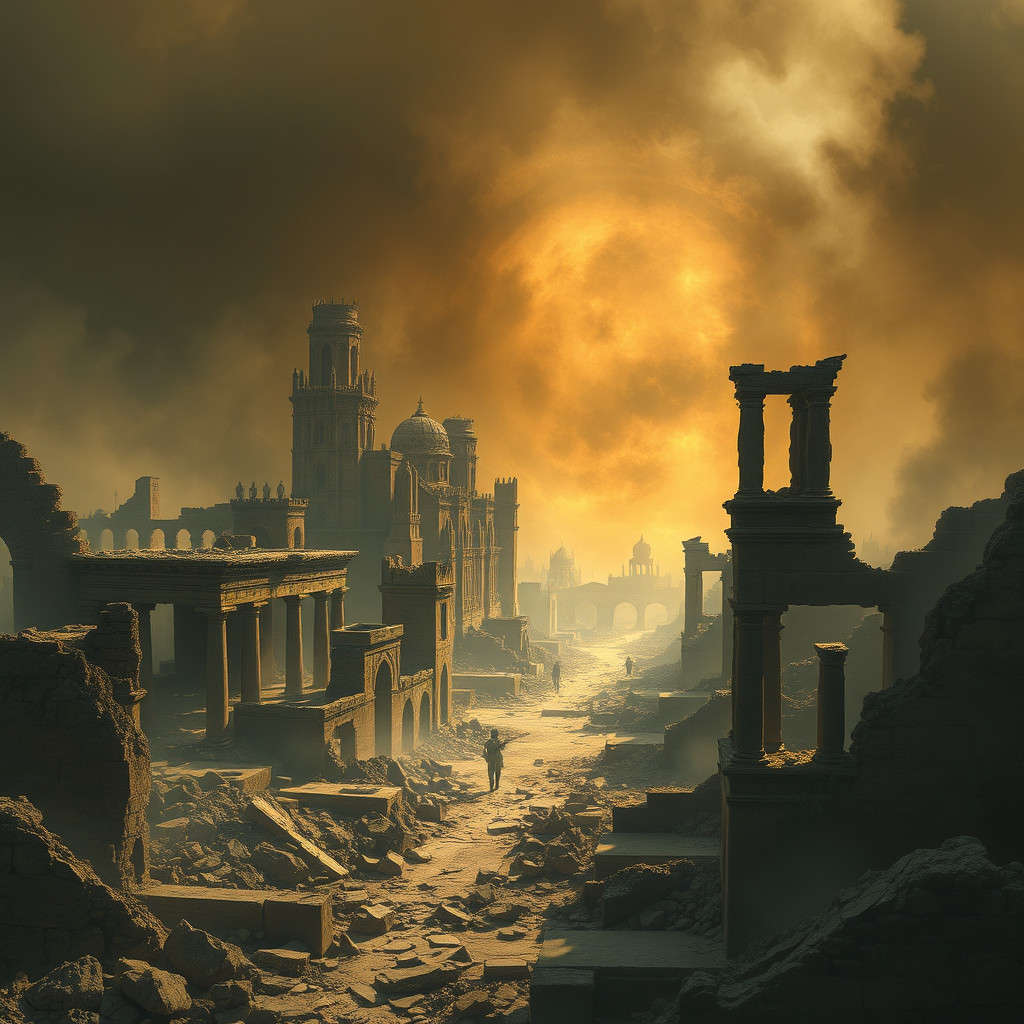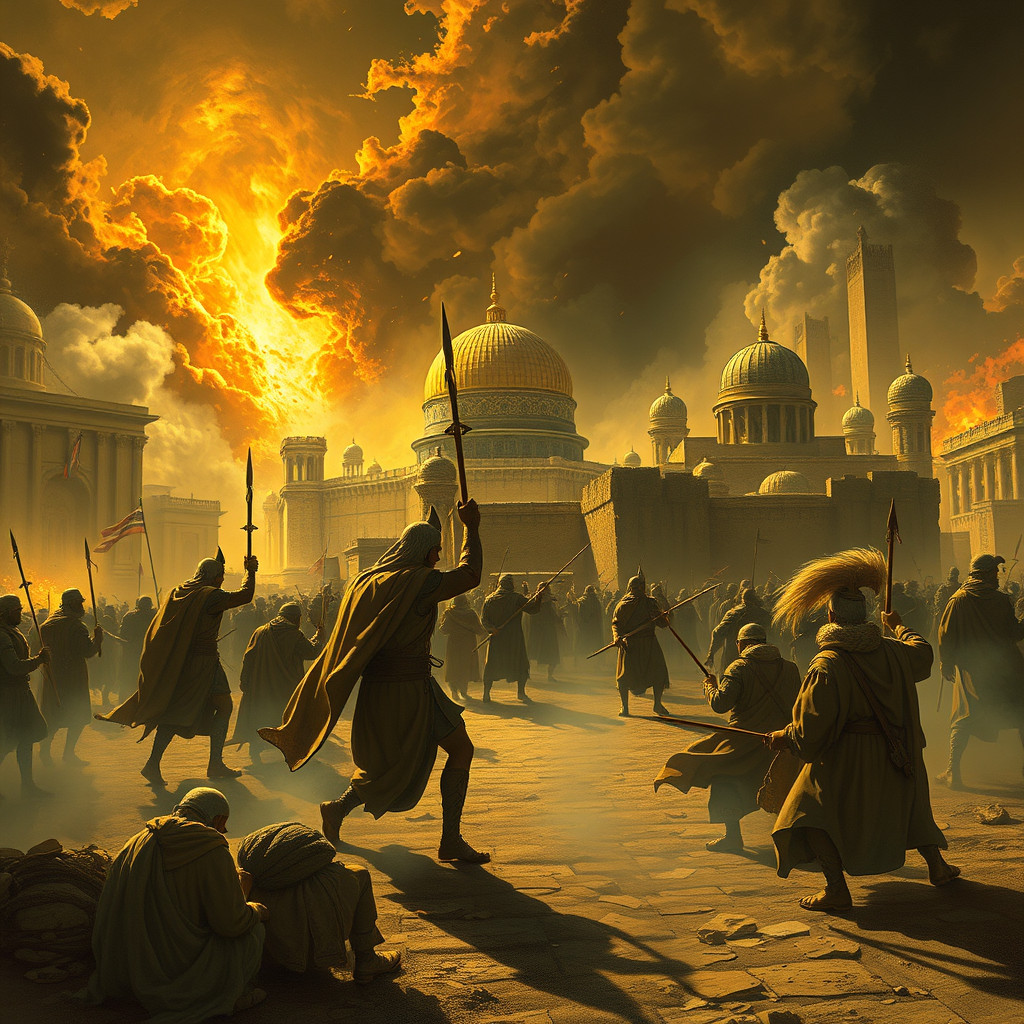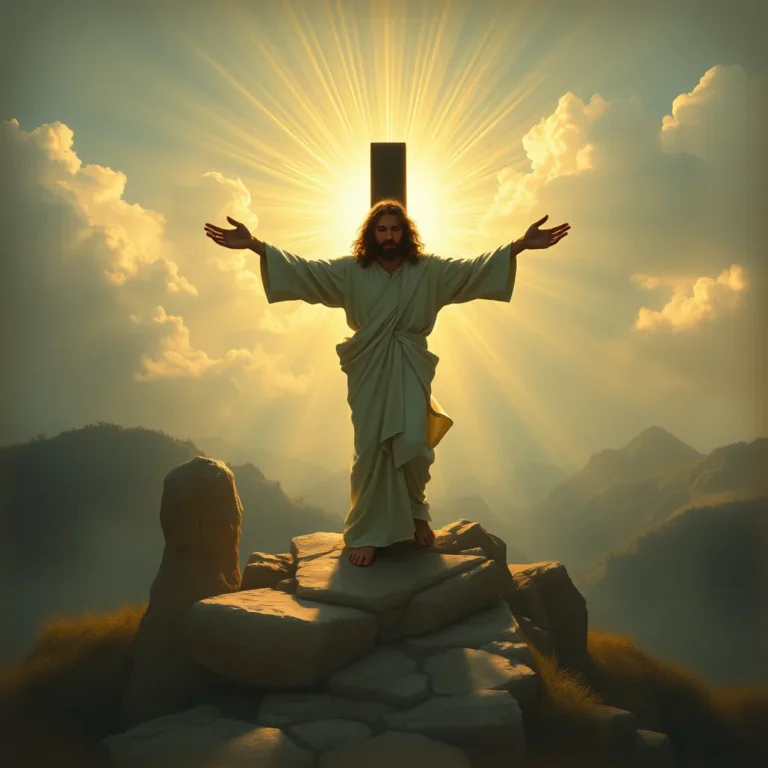
(*All Bible verses are from the NIV unless otherwise noted)
Chapter 18
1 After this I saw another angel coming down from heaven. He had great authority, and the earth was illuminated by his splendor.
2 With a mighty voice he shouted: “ ‘Fallen! Fallen is Babylon the Great!’ She has become a dwelling for demons and a haunt for every impure spirit, a haunt for every unclean bird, a haunt for every unclean and detestable animal.
3 For all the nations have drunk the maddening wine of her adulteries. The kings of the earth committed adultery with her, and the merchants of the earth grew rich from her excessive luxuries.”
4 Then I heard another voice from heaven say: “ ‘Come out of her, my people,’ so that you will not share in her sins, so that you will not receive any of her plagues;
5 for her sins are piled up to heaven, and God has remembered her crimes.
6 Give back to her as she has given; pay her back double for what she has done. Pour her a double portion from her own cup.
7 Give her as much torment and grief as the glory and luxury she gave herself. In her heart she boasts, ‘I sit enthroned as queen. I am not a widow; I will never mourn.’
8 Therefore in one day her plagues will overtake her: death, mourning and famine. She will be consumed by fire, for mighty is the Lord God who judges her.

In 605 B.C., Jerusalem was attacked by the invading armies of the Babylonian Empire. The prophet Daniel, along with many others, was taken captive to Babylon. Eight years later, the warriors of Babylon again swept into Judah. The Temple was sacked, and more captives were taken to Babylon. Ten years later, in 587 B.C., the final blow fell. Jerusalem was crushed and almost every Jew remaining in the kingdom was taken as exiles to Babylon.
Ezekiel was one of the captives taken in the second exile. 2 Kings 24:12-16, describes the conquest that led to Ezekiel’s captivity. There’s no indication that he ever returned to Judah. Ezek 1-24 relates the prophet’s vision as he sees the Glory of God abandoning Jerusalem to its fate of destruction by the Babylonian Empire. He then witnesses the mercy of the Lord as God’s glory returns to the rebuilt temple to consummate the redemption of Israel (Ezek. 43:2).
John has a similar experience in Chapter 18. He witnesses an angel, shining with God’s splendor, descending to the earth. Although the angel’s proclamation is one of judgment, he is also a messenger of hope. His purpose is to announce the triumph of God’s purposes and the final liberation of God’s people from all oppression
The fall of “Babylon”, the symbolic embodiment of godlessness and corruption (characterized by Rome and Jerusalem), is certain. John witnesses a striking vision of kings and merchants who have prospered through Rome’s conquests and trade, lamenting the fall of “Babylon”. Their wealth has accrued through the Empire’s power, and they fear being affected by her downfall.
Rev 18:2
Fallen! Fallen is Babylon the Great!
Rome and Jerusalem epitomized the Babylon John sees falling – the centers of wealth and commerce symbolizing the greater picture of man’s spiritual bondage:
Isa 21:9 Look, here comes a man in a chariot with a team of horses. And he gives back the answer: ‘Babylon has fallen, has fallen! All the images of its gods lie shattered on the ground!’ ”
Rev 18:2
She has become a dwelling for demons and a haunt for every impure spirit, a haunt for every unclean bird, a haunt for every unclean and detestable animal:
Isaiah used similar language to proclaim the violent downfall and chaos that would engulf the once-powerful kingdoms of Babylon and Edom, both of which were examples of the wickedness opposing God.:
Isa 13:21 But desert creatures will lie there, jackals will fill her houses; there the owls will dwell, and there the wild goats will leap about. 22 Hyenas will inhabit her strongholds, jackals her luxurious palaces. Her time is at hand, and her days will not be prolonged.
Isa 34:10 It will not be quenched night or day; its smoke will rise forever. From generation to generation it will lie desolate; no one will ever pass through it again. 11 The desert owl and screech owl will possess it; the great owl and the raven will nest there. God will stretch out over Edom the measuring line of chaos and the plumb line of desolation.
Jesus explained the same eternal principle:
Matt 12:43 “When an impure spirit comes out of a person, it goes through arid places seeking rest and does not find it. 44 Then it says, ‘I will return to the house I left.’ When it arrives, it finds the house unoccupied, swept clean and put in order. 45 Then it goes and takes with it seven other spirits more wicked than itself, and they go in and live there. And the final condition of that person is worse than the first. That is how it will be with this wicked generation.”
These images are descriptive of the spiritual state of any person, country, or system that turns its back on God’s nature of love and mercy as expressed in Jesus Christ. The soul becomes barren like a desert, blasted dry of all living things. Nurture is impossible without the living waters that Christ freely offers:


John 4:10 Jesus answered her, “If you knew the gift of God and who it is that asks you for a drink, you would have asked him and he would have given you living water.”
John 7:38 Whoever believes in me, as Scripture has said, rivers of living water will flow from within them.”
Rev 18:3
For all the nations have drunk the maddening wine of her adulteries:
The reason given for figurative Babylon’s total destruction is now a familiar one:
Rev 14:8 A second angel followed and said, “ ‘Fallen! Fallen is Babylon the Great,’ which made all the nations drink the maddening wine of her adulteries.” 9 A third angel followed them and said in a loud voice: “If anyone worships the beast and its image and receives its mark on their forehead or on their hand, 10 they, too, will drink the wine of God’s fury, which has been poured full strength into the cup of his wrath. They will be tormented with burning sulfur in the presence of the holy angels and of the Lamb.
Rev 17:2 With her the kings of the earth committed adultery, and the inhabitants of the earth were intoxicated with the wine of her adulteries.”
John witnesses something else. He’s been warned repeatedly against the dangers of idolatry. He’s seen the children of the earth continually choose to worship the “beast” rather than the One True God (8:4). However, he’s not gone into any detail as to the exact nature of that idolatry. We are now given the first hint, which will be elaborated on in the next few verses.
Rev 18:3
The kings of the earth committed adultery with her:
As Rome expanded into a world empire, she, like the kingdoms and empires before her, became obsessed with gaining wealth and power at all costs. During the period of Rome’s expansion, the increase in wealth amongst the Roman elite and the substantial growth of slavery transformed the economy1. The Empire became increasingly reliant on slave labor and, by extension, the devaluing of human life. Scholars estimate about 10% (but possibly up to 20%) of the Roman Empire’s population were slaves. For an estimated empire-wide population of 50 million (in the first century AD) between five and ten million were enslaved2. This typified the nature of the “great prostitute”.
Rev 18:3
The merchants of the earth grew rich from her excessive luxuries:
Other verses paint a vivid picture of the greed and avarice that has plagued mankind from the beginning:
Psa 39:6 “Surely everyone goes around like a mere phantom; in vain they rush about, heaping up wealth without knowing whose it will finally be.
Psa 62:10 Do not trust in extortion or put vain hope in stolen goods; though your riches increase, do not set your heart on them.
Jer 22:17 “But your eyes and your heart are set only on dishonest gain, on shedding innocent blood and on oppression and extortion.”
Ezek 27:27 Your wealth, merchandise and wares, your mariners, sailors and shipwrights, your merchants and all your soldiers, and everyone else on board will sink into the heart of the sea on the day of your shipwreck.
Matt 13:22 The seed falling among the thorns refers to someone who hears the word, but the worries of this life and the deceitfulness of wealth choke the word, making it unfruitful.
If successive generations in any society are taught to depend on material gain and prominent position rather than inner spiritual virtue, the moral fabric of individuals and communities begins to stretch, loosen, and unravel:
Evan Andrews writes: Even as Rome was under attack from outside forces, it was also crumbling from within thanks to a severe financial crisis. Constant wars and overspending had significantly lightened imperial coffers, and oppressive taxation and inflation had widened the gap between rich and poor. In the hope of avoiding the taxman, many members of the wealthy classes had even fled to the countryside and set up independent fiefdoms.
At the same time, the empire was rocked by a labor deficit. Rome’s economy depended on slaves to till its fields and work as craftsmen, and its military might had traditionally provided a fresh influx of conquered peoples to put to work. But when expansion ground to a halt in the second century, Rome’s supply of slaves and other war treasures began to dry up. A further blow came in the fifth century, when the Vandals claimed North Africa and began disrupting the empire’s trade by prowling the Mediterranean as pirates. With its economy faltering and its commercial and agricultural production in decline, the Empire began to lose its grip on Europe3.
Rev 18:4
Come out of her, my people, so that you will not share in her sins:
These verses call to mind others that were used to plead with Israel to remain pure after their exile in ancient Babylon was completed:
Isa 52:11 Depart, depart, go out from there! Touch no unclean thing! Come out from it and be pure, you who carry the articles of the LORD’s house.
Jer 51:6 “Flee from Babylon! Run for your lives! Do not be destroyed because of her sins. It is time for the LORD’s vengeance; he will repay her what she deserves.
Jer 51:45 “Come out of her, my people! Run for your lives! Run from the fierce anger of the LORD.
The Lord commanded Israel to leave Babylon’s moral decay and paganism far behind and to separate themselves from its values and activities as well. John sees that, just as in the ancient account, God would also judge spiritual Babylon. The inhabitants of symbolic Babylon are those who, despite all pleadings, warnings, plagues, and prophecies, have refused to repent.
Symbolic Babylon also includes religion that has become stagnant and lifeless due to overly strict adherence to laws and moral codes without spiritual application. Jesus saw these flaws in the teachings and lifestyles of the Pharisees, Sadducees, and Scribes:
Matt 23:23 “Woe to you, teachers of the law and Pharisees, you hypocrites! You give a tenth of your spices—mint, dill and cumin. But you have neglected the more important matters of the law—justice, mercy and faithfulness. You should have practiced the latter, without neglecting the former. 24 You blind guides! You strain out a gnat but swallow a camel.
2 Cor 3:6 He has made us competent as ministers of a new covenant—not of the letter but of the Spirit; for the letter kills, but the Spirit gives life.
Rom 2:29 No, a person is a Jew who is one inwardly; and circumcision is circumcision of the heart, by the Spirit, not by the written code. Such a person’s praise is not from other people, but from God.
Mark 7:21 For it is from within, out of a person’s heart, that evil thoughts come—sexual immorality, theft, murder, 22 adultery, greed, malice, deceit, lewdness, envy, slander, arrogance and folly. 23 All these evils come from inside and defile a person.”
True religion can slowly die from the stranglehold of legalism and can subtly blind even those who claim to know Jesus. The Encyclopedia of Christianity in the United States defines “legalism” as a derogatory label for the belief that following a set of rules, disciplines, and practices will, in and of itself, achieve salvation and right standing before God, as opposed to a belief in salvation through the grace of God. In Christian theology, legalism (or nomism) is a pejorative term for putting the letter of the law above the spiritual application.
Pastor Tim Keller illustrates it this way:
- Strict legalism teaches that belief demands obedience, which leads to salvation;
- The Gospel teaches that belief brings salvation, which leads to obedience.
Rom 2:29 No, a person is a Jew who is one inwardly; and circumcision is circumcision of the heart, by the Spirit, not by the written code. Such a person’s praise is not from other people, but from God.
2 Cor 3:6 He has made us competent as ministers of a new covenant—not of the letter but of the Spirit; for the letter kills, but the Spirit gives life.
The term “legalists” certainly applied to many of the hostile Jewish leaders and teachers who confronted Jesus. In trying to protect their own prestige and power, they had forgotten the spirit of the law. Jesus often addressed this issue:
- The letter of the law says don’t commit adultery. The spirit of that law is that anyone who looks at a woman lustfully has already committed adultery with her in his heart. (Matt 5:28)
- The letter of the law tells us not to murder. The spirit of the law calls us to control our anger and not even call others insulting names! (Matt 5:21-22)
Today, a Christian business owner might feel good about donating to charities, yet exploit their own employees with low wages and excessive work hours. Christians may feel “righteous” because they attend church each Sunday, sit on the governing board, and feel they are following the “letter of the law”, yet they could be neglecting the more important issues of justice, mercy, and generosity.
Rev 18:5
Her sins are piled up to heaven, and God has remembered her crimes:
For many leaders among the Jews, the pride of position and the trappings of wealth had taken precedence over charity and humility:
Isaiah 1:11 “The multitude of your sacrifices— what are they to me?” says the LORD. “I have more than enough of burnt offerings, of rams and the fat of fattened animals; I have no pleasure in the blood of bulls and lambs and goats. 12 When you come to appear before me, who has asked this of you, this trampling of my courts? 13 Stop bringing meaningless offerings! Your incense is detestable to me. New Moons, Sabbaths and convocations— I cannot bear your worthless assemblies. 14 Your New Moon feasts and your appointed festivals I hate with all my being. They have become a burden to me; I am weary of bearing them. 15 When you spread out your hands in prayer, I hide my eyes from you; even when you offer many prayers, I am not listening. Your hands are full of blood! 16 Wash and make yourselves clean. Take your evil deeds out of my sight; stop doing wrong. 17 Learn to do right; seek justice. Defend the oppressed. Take up the cause of the fatherless; plead the case of the widow.
Matthew 23:1 Then Jesus said to the crowds and to his disciples: 2 “The teachers of the law and the Pharisees sit in Moses’ seat. 3 So you must be careful to do everything they tell you. But do not do what they do, for they do not practice what they preach. 4 They tie up heavy, cumbersome loads and put them on other people’s shoulders, but they themselves are not willing to lift a finger to move them. 5 “Everything they do is done for people to see: They make their phylacteries wide and the tassels on their garments long; 6 they love the place of honor at banquets and the most important seats in the synagogues; 7 they love to be greeted with respect in the marketplaces and to be called ‘Rabbi’ by others.
Pagan Rome fared even worse. The Empire’s leaders, as well as the general populace, had descended into the depravity of blood sport, slavery, deception, and murder – all in the relentless pursuit of physical gratification and lust.
Gibbons observed: Captives taken in war were, in all probability, the first persons subjected to perpetual servitude, and when the necessities or luxury of mankind increased the demand for slaves, every new war recruited their number by reducing the vanquished to that wretched condition. Hence proceeded the fierce and desperate spirit with which wars were carried on among ancient nations…
…The public spectacles were an essential part of the cheerful devotion of the Pagans, and the gods were supposed to accept, as the most grateful offering, the games that the prince and people celebrated in honor of their peculiar festivals. The Christians, who with pious horror avoided the abomination of the circus or the theatre, found himself encompassed with infernal snares in every convivial entertainment, as often as his friends, invoking the hospitable deities, poured out libations to each other’s happiness. (Edward Gibbons, The Decline and Fall of the Roman Empire, Chapter 2, part 2, and Chapter 15, part 3)
Rom 12:2 Do not conform to the pattern of this world, but be transformed by the renewing of your mind. Then you will be able to test and approve what God’s will is—his good, pleasing and perfect will.
The Greek word hagios and the Hebrew chasid mean “holy one(s)” and are translated in many Bible versions as “saints.” The term “saints” refers to devoted believers who embody Godly characteristics. Saints are not meant to withdraw from the world but to live in a sanctified manner within it:
John 17:15 My prayer is not that you take them out of the world but that you protect them from the evil one. 16 They are not of the world, even as I am not of it. 17 Sanctify them by the truth; your word is truth. 18 As you sent me into the world, I have sent them into the world. 19 For them I sanctify myself, that they too may be truly sanctified. 20 “My prayer is not for them alone. I pray also for those who will believe in me through their message, 21 that all of them may be one, Father, just as you are in me and I am in you. May they also be in us so that the world may believe that you have sent me.
Rev 18:6
Give back to her as she has given; pay her back double for what she has done:
This double recompense for wrong-doing is an echo of Exodus 22:
Exod 22:4 If the stolen animal is found alive in their possession—whether ox or donkey or sheep—they must pay back double.
Exod 22:7 “If anyone gives a neighbor silver or goods for safekeeping and they are stolen from the neighbor’s house, the thief, if caught, must pay back double.
Exod 22:9 In all cases of illegal possession of an ox, a donkey, a sheep, a garment, or any other lost property about which somebody says, ‘This is mine,’ both parties are to bring their cases before the judges. The one whom the judges declare guilty must pay back double to the other.
In the final analysis, Judgment is the Lord’s alone (Deut. 32:35, Rom. 12:19, Heb. 10:30).
Rev 18:7
In her heart she boasts, ‘I sit enthroned as queen. I am not a widow; I will never mourn’:
All too often, we only turn to God when struck by heartbreak and disaster. On the other hand, consider how arrogance and pride profess no need of God and blind us to Jesus’ message:
Ps 10:4 In his pride, the wicked man does not seek him; in all his thoughts, there is no room for God.
Ps 17:10 They close up their callous hearts, and their mouths speak with arrogance.
Rev 18:8
Therefore in one day her plagues will overtake her: death, mourning and famine.
God freely forgives His repentant children and forgets their sins:
Heb 8:8 But God found fault with the people and said: “The days are coming, declares the Lord, when I will make a new covenant with the people of Israel and with the people of Judah. 9 It will not be like the covenant I made with their ancestors when I took them by the hand to lead them out of Egypt, because they did not remain faithful to my covenant, and I turned away from them, declares the Lord. 10 This is the covenant I will establish with the people of Israel after that time, declares the Lord. I will put my laws in their minds and write them on their hearts. I will be their God, and they will be my people. 11 No longer will they teach their neighbor, or say to one another, ‘Know the Lord,’ because they will all know me, from the least of them to the greatest. 12 For I will forgive their wickedness and will remember their sins no more.”
But the record of sins, so to speak, remains open to those who stubbornly refuse the offer of divine mercy.
Gal 6:7 Do not be deceived: God cannot be mocked. A man reaps what he sows. 8 Whoever sows to please their flesh, from the flesh will reap destruction; whoever sows to please the Spirit, from the Spirit will reap eternal life.
Natural law in the created order is one of cause and effect. Every action has an effect, good or bad; sooner or later. There is no getting away from the fact that punishment (consequences) unavoidably follows sin:
Ezek 23:35 “Therefore this is what the Sovereign LORD says: Since you have forgotten me and turned your back on me, you must bear the consequences of your lewdness and prostitution.”
Ezek 23:49 You will suffer the penalty for your lewdness and bear the consequences of your sins of idolatry. Then you will know that I am the Sovereign LORD.”
The ancients saw those consequences as punishments handed down by an angry God. From a New Covenant perspective, a loving and forgiving God warns His children that their insistence on living contrary to Jesus’ teachings unavoidably leads to suffering. Lies erode trust. Abusing others provokes bitterness. Hate crushes forgiveness. Every road of sinful behavior inescapably leads to broken lives and shattered relationships!
Footnotes
- Hopkins, Keith. Conquerors and Slaves: Sociological Studies in Roman History. Cambridge University Press, New York. Pgs. 4–5. ↩︎
- Slavery in Ancient Rome, The British Museum, https://www.britishmuseum.org/exhibitions/nero-man-behind-myth/slavery-ancient-rome, retrieved February 27, 2023. ↩︎
- 8 Reasons Why Rome Fell, Evan Andrews, https://www.history.com/news/8-reasons-why-rome-fellUpdated: September 5, 2023, retrieved June 28, 2024. ↩︎
*All Scripture quotations, unless otherwise indicated, are taken from the Holy Bible, New International Version®, NIV®. Copyright ©1973, 1978, 1984, 2011 by Biblica, Inc.™ Used by permission of Zondervan. All rights reserved worldwide. www.zondervan.comThe “NIV” and “New International Version” are trademarks registered in the United States Patent and Trademark Office by Biblica, Inc.™





